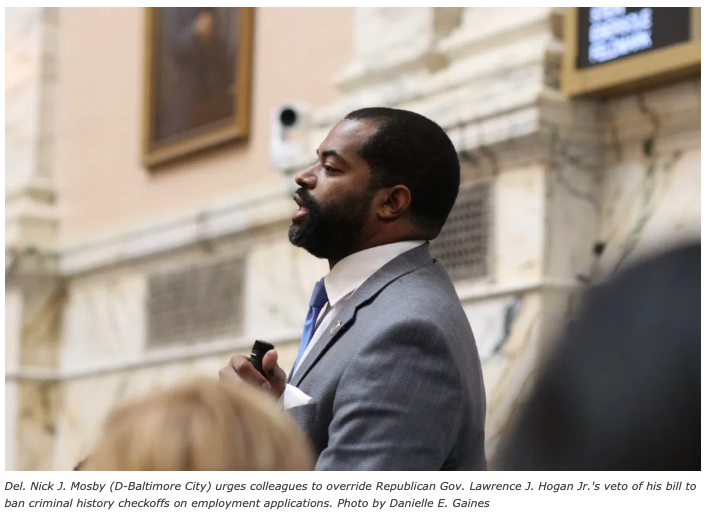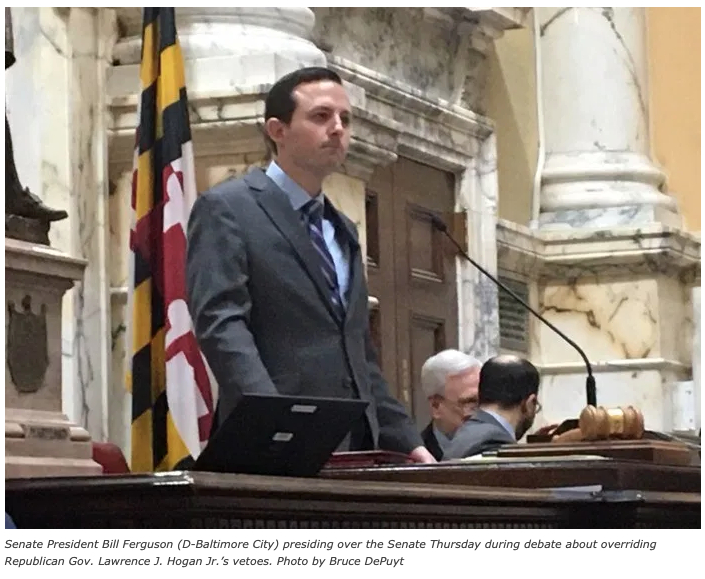 Democrats overrode a handful of vetoes from Republican Gov. Lawrence J. Hogan Jr. on Thursday, adding Maryland to the list of states that have banned the box for criminal history checkoffs on employment applications and repealing the state’s politically controversial Handgun Permit Review Board.
Democrats overrode a handful of vetoes from Republican Gov. Lawrence J. Hogan Jr. on Thursday, adding Maryland to the list of states that have banned the box for criminal history checkoffs on employment applications and repealing the state’s politically controversial Handgun Permit Review Board.
The chambers did not move forward with override votes on three measures that Hogan vetoed last year which would have increased legislative oversight of the Governor’s Appointments Office, mandated two-person crews on certain freight trains, and addressed bikeway funding in the state.
Here’s a quick look at the measures where lawmakers overrode the governor’s veto and some of the debate. The votes were mainly along party lines:
Repeal of the Handgun Review Board, Senate Bill 1000 and House Bill 1343
Maryland’s Handgun Permit Review Board has been the topic of legislative debate for the last few years, as lawmakers have raised concerns about Hogan’s appointees to the panel, which considers appeals of Maryland State Police decisions on handgun permits.
This bill repeals the board and will direct appeals through the Office of Administrative Hearings instead.
For the override: Del. Vanessa E. Atterbeary (D-Howard) said repealing the board would take politics out of handgun permit decisions by putting them in the hands of judges. “It makes common sense that you would have 40 individuals with legal training and expertise on gun laws in our state, who are ready and willing to take on these cases in an unbiased nonpolitical manner and just look at the facts. Right now, we have five individuals who are political appointees.”
In opposition: “We have a very odd approach to firearms in our state. We seem reticent to really crack down on… violent gun crime that is done with illegal guns,” Sen. Justin Ready (R-Carroll) said. “…Yet we’re afraid to give law-abiding citizens the ability ― once they’ve passed a background check and gone through training ― to have access to a firearm that can keep them safe.”
The tally: Eighty-nine delegates voted to override Hogan’s veto in the House. The Senate voted 30-16 in favor of the veto, with Democratic Sen. Katherine A. Klausmeier (Baltimore County) joining Republicans.
Dream Act alterations, Senate Bill 537 and House Bill 262
The Dream Act, which first became law in 2012, allows Maryland high school graduates including undocumented immigrants to qualify for the lowest tuition rates at public colleges and universities under certain circumstances.
This measure removes the requirement that someone must go to community college before going to a four-year college and lifts a requirement that students must have attended three years of high school in Maryland, though graduation from a state high school is still required. Students and their parents must still show a record of paying taxes to be eligible for in-state tuition.
For the override: “I have a grandmother who was born in Russia. She had the opportunity go to medical school. She was the only female in her class — an immigrant from Russia. What I learned from my parents and my grandparents is that America is not about where we come from, it’s about where we’re going,” Sen. James C. Rosapepe (D-Prince George’s) said during debate.
In opposition: Del. Nino Mangione (R-Baltimore County) said illegal immigration brings “serious harms” to the state and he fears the bill could encourage more illegal immigration. “I simply look at this bill as a benefit to people that are here illegally over people that are here legally. I look at it as pulling from the resources that may come from those that have spent their entire lives here in Maryland and not just been here for a year, again, illegally.”
The tally: The House voted 95-43 and the Senate voted 31-15 to override the vetoes.
Oyster management plans, Senate Bill 830 and House Bill 720
This measure establishes a consensus-based process to create a new oyster fishery management plan for the state involving environmentalists, watermen and seafood sellers.
Environmental advocates say the measure maintains sustainable oyster fisheries by taking a scientific approach to harvests, while watermen are worried about restrictions on their haul.
Hogan said the bill was an attempt to delay the state’s implementation of a proposed oyster management plan and moved the goalposts on the state’s environmental targets.
For the override: “The intention with this bill was to make sure that we took the politics out of the oyster fishery and we put it into the hands of the people who do it most — the watermen, the scientists, the advocates — who live and breathe this issue day in and day out,” Sen. Sarah K. Elfreth (D-Anne Arundel) said. “Fifty-nine percent of the oyster advisory commission will be made up of the industry, will be made up of watermen.”
In opposition: Del. Johnny Mautz (R-Middle Shore) has been a member of the Oyster Advisory Commission for six years and said he worried the bill could cause economic harm to Bay communities. “We’re tipping the scales and you’re putting the scientists in charge,” Mautz said. “…Do you want to grow oysters or do you want to study oysters?”
The tally: The House voted 95-43 to override the veto on the House version of the bill and 94-40 to override the veto of the Senate bill. The vote was 31-15 in favor of an override on both measures in the Senate.
State personnel grievance procedures, House Bill 891
This bill directs certain state employee grievances related to collective bargaining agreements that currently go through the State Labor Relations Board to the Office of Administrative Hearings instead.
Unions that advocated for the change said it would streamline grievances and create a more predictable process.
In vetoing the legislation for a second time, Hogan said the bill would shift the cost of the grievance proceeding from the negotiated process, which shares the cost between the state and unions, to one which would be borne entirely by the state.
For the override: Del. Marc Korman (D-Montgomery) described the bill as a minor change in process. “This simply streamlines into one proceeding to make it more simple and straightforward for our workers … to file grievances against the state,” he said.
In opposition: Del. April Rose (R-Carroll) argued that the measure sets a bad precedent. “The bill completely undermines the ability of the state to bargain in good faith with state employee unions because it shows that the General Assembly is willing to insert themselves into the bargaining process,” she said. “An action such as this will create a breach of trust between the two parties and will only further complicate future negotiations.”
The tally: The House voted 96-41 in favor of an override, the Senate voted 31-15 to override.
 “Ban the Box” criminal record screening, House Bill 994 and Senate Bill 839
“Ban the Box” criminal record screening, House Bill 994 and Senate Bill 839
This measure prohibits private employers from including a checkbox about criminal history on job applications and would prohibit companies with 15 or more employees from asking an applicant about their criminal history at any time before the first in-person interview.
Advocates for the bill said it would help people who’ve made mistakes in the past and who currently face tough odds re-establishing themselves in society without gainful employment.
The bill was opposed by the Maryland Chamber of Commerce and other business groups.
For the override: Del. C.T. Wilson (D-Charles) shared a personal story about his support for banning the box. Wilson said when he was 18, he was convicted of disturbing the peace for an incident in which he was “taking a beating” from a police officer in the Midwest. After military service and finishing law school, he found himself unable to get calls back for job after job because of the charge until former Prince George’s County state’s attorney Glenn Ivey (D) took a chance on him.
“He let me come in. He let me wow him, do my song and dance,” Wilson said. “…I had one opportunity and I knew that. The very fact that I had the opportunity to talk to an employer …meant I had to give it my best.”
In opposition: Senate Minority Leader J.B. Jennings (R-Harford) said the measure unnecessarily removes transparency from the hiring process. “You’re giving these people hope that they’re going to get through the door,” Jennings said. “… It’s making it tough for employers. You’re giving false hope to these employees — these potential employees — when they’re filing out these applications and they’re going in for these interviews only to be stopped.”
The tally: The House voted 95-42 in favor of overriding the vetoes and the Senate voted 31-15.
The bills that didn’t make it
Although the legislature overrode five Hogan vetoes with relative ease, the governor did eke out victories on three other measures.
Rather than hold a formal vote on the bills, as expected, lawmakers took a pass, opting instead to postpone the veto overrides “indefinitely.” In theory, debate over the vetoes could be resurrected during this year’s General Assembly session, but that appears unlikely as of now.
Two-person train crew, Senate Bill 252 and House Bill 66
In vetoing the measure last year, Hogan said it would harm Maryland’s economy by inserting the state into a dispute between a private employer and its workers. Unions representing rail workers and safety advocates backed the measure.
Had it passed, the bill would have created an additional cost burden on CSX, owner of the freight lines that run through the state. Recently the company agreed to contribute $113 million toward the historic $466 million Howard Street Tunnel project in Baltimore, which state leaders have said will greatly help the Port of Baltimore because the enlarged tunnel will be able accommodate double-stack trains.
Asked if the project played a role in the legislature’s decision not to attempt an override, Senate President Bill Ferguson (D-Baltimore City) called the tunnel expansion “a really important project for the future economic prosperity of Maryland and it certainly came into play as part of the discussion.”
Bikeways funding, House Bill 1281
This bill required the state to budget $3.8 million per year to expand its bike lane program through the 2024 fiscal year.
Although he vetoed the measure last year, Hogan announced late last month that his administration will make $3.8 million available in each of the next two years for the bikeways program.
In the Senate, the bill was expanded to make changes to the Central Maryland Regional Transit Plan, which prompted Hogan’s veto.
Lawmakers decided to declare victory and spare Hogan a veto override on this one.
Governor’s Appointments Office oversight, Senate Bill 751
This measure from Sen. Clarence K. Lam (D-Howard) would have required a full report on the appointments office’s involvement in vetting state government job candidates and require the Maryland attorney general’s office to create an anonymous tip line and email where possible violations of the state’s hiring process could be reported.
The bill originally passed the Senate chamber with 26 affirmative votes in 2019, three shy of the number needed for a successful override.
Since last year’s debate, Hogan’s Appointments Secretary Christian E. Cavey said his office is less involved in state hiring than some lawmakers believe.
By Danielle Gaines
Don’t miss the latest! You can subscribe to The Chestertown Spy‘s free Daily Intelligence Report here



Gren Whitman says
Marylanders to Prevent Gun Violence monitored the Review Board for the past two years ago, documenting the board’s bias and neglect of due diligence.
MPGV is to be commended for its watchdog role in making our state’s gun laws and regulations stronger and saner.